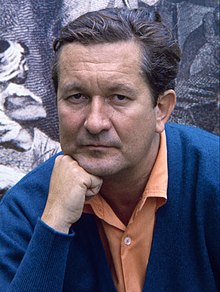William Styron
William Styron | |
|---|---|
 William Styron, 1967 | |
| Born | William Clark Styron Jr. June 11, 1925 Newport News, Virginia, U.S. |
| Died | November 1, 2006 (aged 81) Martha's Vineyard, Massachusetts, U.S. |
| Occupation | Novelist, essayist |
| Alma mater | Duke University |
| Period | 1951–2006 |
| Notable works | Lie Down in Darkness The Confessions of Nat Turner Sophie's Choice Darkness Visible |
| Spouse | Rose Burgunder (m. 1953) |
| Children | 4, including Alexandra |
| Signature |  |
William Clark Styron Jr. (June 11, 1925 – November 1, 2006) was an American novelist and essayist. He wrote five novels and other books of essays and life stories (memoir).
Styron was born and raised in Newport News, Virginia. He had a hard time at a number of schools, but he graduated from Christchurch School in southeast Virginia in 1942.[1]
In college during World War II, he joined the Marines’ reserve officer training program. In July 1945 he was given a job to help with the invasion of Japan, but the war ended a month later. He soon left the Marines and went back to graduate from Duke University in 1947.[2]
In the 1950s he lived in Paris. With other young writers, he helped to begin a magazine called The Paris Review.[3]
During the ten years from 1951 to 1960, he published his first three novels (Lie Down in Darkness, The Long March, and Set This House on Fire). His fourth novel, The Confessions of Nat Turner was both popular and a problem. It won the Pulitzer Prize for Fiction in 1968. But many Black readers and critics did not like the book. The book was written in the voice of a 19th century Black man. They thought that Styron, a White author, did not understand the ways of African Americans.[4]
Styron took more than ten years to write his last novel, Sophie's Choice. This book looks at a character who lived through the Nazi death camp of Auschwitz. It was also popular and a problem.[5] A movie was made from this book in 1982.
In 1990, Styron published Darkness Visible. This book told a story of his own life, about having the mental illness of depression. One reason he wrote it was to go against an idea of that time that depression was a shameful thing.[6]
When he died in 2006, one obituary praised him as "a courageous writer who in a long career never played it safe, either with himself or his talent."[7]
Books[change | change source]
- Lie Down in Darkness (1951)
- The Long March (1956)
- Set This House on Fire (1960)
- The Confessions of Nat Turner (1967)
- Sophie's Choice (1979)
- This Quiet Dust and Other Writings"" (1982/1993)
- Darkness Visible: A Memoir of Madness (1990)
References[change | change source]
- ↑ Lehmann-Haupt, Christopher (2006-11-02). "William Styron, Novelist, Dies at 81". The New York Times. ISSN 0362-4331. Retrieved 2023-01-05.
- ↑ Lehmann-Haupt, Christopher (2006-11-02). "William Styron, Novelist, Dies at 81". The New York Times. ISSN 0362-4331. Retrieved 2023-01-05.
- ↑ "William Styron | Biography, Books, Sophie's Choice, Nat Turner, Darkness Visible, & Facts | Britannica". www.britannica.com. Retrieved 2023-01-05.
- ↑ Lehmann-Haupt, Christopher (2006-11-02). "William Styron, Novelist, Dies at 81". The New York Times. ISSN 0362-4331. Retrieved 2023-01-05.
- ↑ "William Styron | Biography, Books, Sophie's Choice, Nat Turner, Darkness Visible, & Facts | Britannica". www.britannica.com. Retrieved 2023-01-05.
- ↑ "Obituary: William Styron". the Guardian. 2006-11-03. Retrieved 2023-01-05.
- ↑ "Obituary: William Styron". the Guardian. 2006-11-03. Retrieved 2023-01-05.
